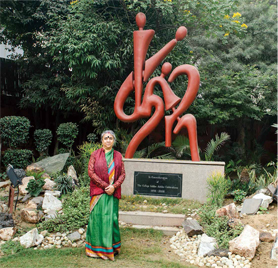
While many institutions focus exclusively on academic acumen, the main emphasis of Delhi based Lady Shri Ram College for Women, is all round development. Its motto is ‘Sa vidya ya vimuktaye’, which means “That alone is knowledge which leads to liberation.” Thus, the college believes that academic achievements are only a part of one’s education: liberation of your own self and engagement with the social and intellectual challenges of your times is equally important
In the early years of independent India, there were many barriers to women’s education. But our founder, Sir Shri Ram, had very clear vision. Being a close associate of Mahatma Gandhi, he firmly believed that only the enlightened and educated women could change India
Higher educational institutions are aplenty in India but Lady Shri Ram College for Women (LSR) of Delhi University (DU) is one institution that has been dominating the study of courses in Liberal Arts (or Humanities) for quite some time. So much so that today it has become the benchmark for all other colleges in India and even South Asia. No wonder, it has been ranked number one by India Today-Nielson survey consistently for the last five years, a no simple feat!
LSR is the destination where every girl wants to reach, but where getting admission is tough, as you have to be the best to gain access to its brilliant faculty and brightest of students.
What really makes this 60-year-old all women’s institution a leader in the comity of India’s best colleges? Is it its aesthetically-appealing and environmentally-responsible campus, which has won several DU awards for providing that welcome “touch of inspiration”? Or is it its elegant and striking landscaping and architecture that surround its lush green lawns and serene spaces that create an old-world charm in its otherwise chaotic surroundings? Or is it the fact that it has a very impressive list of alumni who dominate the world of India’s civil services, politics, media, entertainment, corporate world and the rest?
Survey reports say besides all these, LSR and the top colleges like DU’s St Stephen’s and Chennai’s Loyola share a few common traits: besides providing quality education and lots of extra-curricular activities to explore hidden talents, they also offer a memorable campus experience that instils pride and loyalty for decades and help you earn well-paying jobs quite early in your career.
But what about its focus on academic prestige, intellectual horsepower and scholarly excellence and, above all, high-premium success in the post-college high-end job market that places LSR students, especially from the Economics stream, stand tall amongst from the rest?
To know what makes LSR a great institution, Corporate Citizen spoke to its extremely articulate Principal, Dr Suman Sharma, who is well-known for her expertise in South Asian affairs. Herself a product of LSR, she has been associated with Delhi University colleges for over three decades and contributed significantly for well-being at different levels. Excerpts:
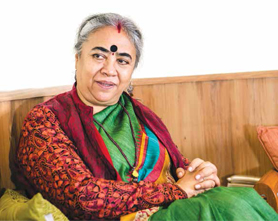
I can’t single out one factor but we’re different because besides focussing on academic excellence, we also encourage our students to think critically, live honourably and engage with social and intellectual challenges. Another key factor in the style of teaching. LSR faculty is known for its professional competence and commitment. We’re different because our faculty student mentoring ratio is 1:5 and the average class size is only 30. LSR is also recognised for its traditions of discipline and scholarship. We also have a non-interfering management and a pool of top-ranking students from across the country. These are our USPs. Besides, we offer our students vibrant and dynamic campus life, brimming with intellectual exploration and celebration of diversity and inclusivity. We’re also passionate about life outside classroom and encourage free and spirited exchange of ideas through group interactions that motivate students to speak up their mind and take up leadership roles. We also expose them regularly to leaders who have made an impact in their fields and encourage students’ community initiatives.
We’ve started initiatives like the Women Development Cell which engages with gender-related issues and consistently highlights issues of violence against women. Another is REACH, which is an acronym for Reaffirming Equity, Access, Capacity and Humanism and deals with issues of affirmativeness and inclusive learning. Voluntary Agency Placement Program, helps students to make a positive contribution to community development and social welfare. We also have Dhyana, the Society for Consciousness and Awareness, which encourages experiential learning. We’ve also launched several community-related projects including a health initiative for women of the nearby urban village Zamrudpur. Under a program called Connecting Dreams, our students have adopted a village and set-up a community radio to be in constant touch with rural women. LSR has also begun Project Maati, an initiative to encourage organic farming in a village in Faridkot (Punjab) and to help market the products made by village women in Delhi. To provide a truly inclusive environment, the college offers a state-of-the-art Resource Centre that enables differently abled and lesser-privileged students’ access to the latest assistive technologies. We also have extremely active units of NCC, NSS and National Sports Organisation.
We offer our students vibrant and dynamic campus life, brimming with intellectual exploration and celebration of diversity and inclusivity. We’re also passionate about life outside classroom and encourage free and spirited exchange of ideas through group interactions that motivate students to speak up their mind and take up leadership roles
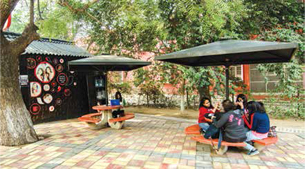
LSR was founded in 1956 in New Delhi by one of the top nationalist corporate leaders of independent India, late Sir Shri Ram, in memory of his wife. It had its modest beginnings in a school building in Daryaganj in Central Delhi with just 243 students, nine faculty members, four support staff and three distinct study courses. It aimed to provide access to higher education of quality to women and has since blossomed into an institution of national excellence.
Today, the college has a beautiful 15-acre campus in South Delhi, with approximately 2300 students, over 150 faculty members, 80 person administrative and support staff and 16 study courses. The entire campus is Wi-Fi enabled. The college has 103 classrooms, most equipped with multi-media projectors and two state-of-theart computer laboratories with Internet connection. Besides, we have two well-equipped seminar halls and an auditorium with a capacity to accommodate 700 persons. Under the inspiring chairmanship of industrialist and philanthropist, late Dr Bharat Ram, LSR became a byword for academic and extra-curricular achievements. A Board of Governors, drawn from the fields of industry, law, journalism, academics and the bureaucracy, assist the current Chairman, Arun Bharat Ram, in running the college.
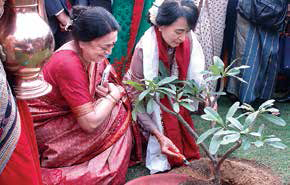
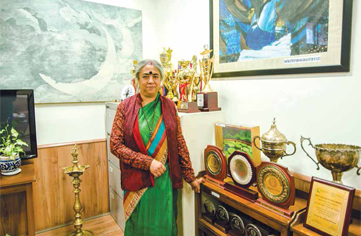
We are very proud of our alumnae who have been trailblazers in various fields—be it media, entertainment, politics, diplomacy, law, academia, civil services, NGO sector, corporate world and the rest. Among them are NDTV’s news anchor Nidhi Razdan, documentary filmmaker Vandana Kohli, Union Cabinet Minister Maneka Gandhi, Chhavi Rajawat (Sarpanch of Soda village, Rajasthan); actresses Sakshi Tanwar, Shriya Saran, Priyanka Sharma, Lushin Dubey; interior designer Padma Shri Sunita Kohli, corporate leaders Vinita Bali (MD & CEO of Britannia Industries), Naina Lal Kidwai (CEO, HSBC India), Sushma Berlia (Industrialist, Educationist and Entrepreneur) and Sindhushree Khullar (CEO, NITI Aayog); Painter Arpana Kaur; Bharatnatyam exponent Geeta Chandran; Social Activist Anjali Bhardwaj; Academician Gita Gopinath (Professor of Economics at Harvard). The list is just endless. The tallest among them is the Nobel Prize for Peace winner and Myanmar’s charismatic leader Aung San Suu Kyi, in whose name we’ve opened an ASSK Centre—where we run a short-term diploma course in Conflict Transformation and Peace Building. It’s open to even outsiders, including boys. Lots of professional engineers, doctors, journalists and defence personnel have participated in it.
In the early years of independent India, there were many barriers to women’s education. But our founder, Sir Shri Ram, had very clear vision. Being a close associate of Mahatma Gandhi, he firmly believed that only the enlightened and educated women could change India. So, he established LSR as a protective space for young girls from conservative families, who would otherwise not get an opportunity to get quality higher education
Oh yes! Tina Dabi, the IAS topper of 2015, is from LSR. She got lots of media attention because she’s very articulate and has a very sound sense of social responsibility. Moreover, she wrote her IAS exam immediately after passing BA (Hons) and made it. When we felicitated her at LSR, she said, “Please don’t judge me now, but judge me by what I’m able to do for the people in general.” She had many options but she chose Haryana cadre because the gender sensitivity is very low in Haryana and she wants to work on women-specific issues of the State. Tina truly reflects the LSR spirit and we are very proud of her. Former foreign secretary Sujatha Singh was also from LSR. We’ve LSR alumnae at the level of secretaries in various government departments. Lots of our young girls are doing pretty well in the NGO sector. In politics, former Delhi Minister, Kiran Walia and current Union Minister Anupriya Patel have been our students. In the fashion world, Ritu Beri is from LSR. In Bollywood, Leena Yadav has been our student. Shah Rukh Khan’s wife Gauri Khan and Shahid Kapoor’s wife Meera Rajput are also from LSR.
Oh yes. A number of them keep coming and asking me, “Ma’am we’ve received so much from LSR, how we can return it?” We’ve a very active alumni association, called ELSA, which has a very deep connect with the college. The distinguished alumni are beacon lights and source of inspiration for our students. They are always available as resource persons and in any other capacity needed by us. We’ve a very liberal fellowship and freeship program. Last year, thanks to their support, we gave scholarships worth more than Rs. 60 lakh to our students.
I stepped out of LSR in 1979. I took admission 40 years back, in 1976, and even then, it was an institution of excellence, though life was simple and things were a little different. In those days, you would find lot of Muslim girls on the campus. LSR started from Daryaganj. Therefore, a lot of girls from the Chandni Chowk and Lal Qila area would come here and deposit their burqa at the gate. Coming from traditional families, they would experience the change and do extremely well in studies.
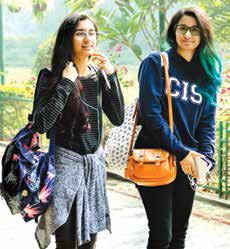
They become smart, intelligent and women of substance. Even those who become homemakers, are different because they speak their mind. Whatever they want to do, they’re able to do because at LSR, as they get empowered with the tools needed to make it happen. This place is different. It is not commercialised. Body language and confidence level of even those, who come here from India’s remote areas, changes in just six months, and it reflects on their personality. For example, recently, while taking interviews for some job positions for Fukuoka University of Japan, I met an LSR student who came from Jharkhand. She said, when she joined LSR, she was overawed by the ambience for a month. But with the help of some senior students, she picked up the language and understood how things work here. Thus, she regained her confidence. Now she wants this international job because the experience will help her change the scenario in her extremely backward village in Jharkhand. She wants to be a role model for her village just like Chhavi Rajawat, India’s first and youngest woman sarpanch of Rajasthan’s Soda village.
We’ve around 22 societies covering dramatics,music, dance, public speaking, debating, elocution, quiz and a whole lot. They have a very healthy competition within themselves. We’ve an annual event−Tarang−and last time, the footfall was around 15,000. We had invited students from DU colleges and even from outside Delhi. So, this time it was a national event. We got teams from all over India. Last month, our Commerce department organised a function attended by more than 50 teams from within India and around 65 students came from Nepal and Bhutan. Our very active and elected students’ union co-ordinates working of these Societies.
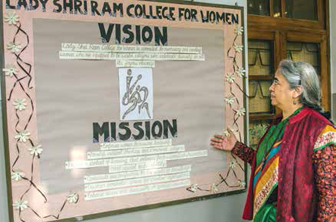
LSR’s record is pretty impressive in this respect. Our placement cell has helped students get respectable jobs in top corporate houses including Google, GE, McKinsey, Ernst & Young, HLL, Watson Wyatt, Capital IQ, Jaypee Capital, Indian Express, Zee News and Star Magna, to name just a few. Students of Economics and Commerce departments are always in big demand. As for industry interaction, thanks to the alumnae network, LSR students get a good industry exposure. We also try to give hands-on experience to students. For example, the Sociology and Education Departments take their students on field trips. LSR has a society called Voluntary Agency Placement Programme, which places students with NGOs in diverse fields. The college also imparts skill training through its outreach programmes and placement cell. Experts are called regularly to interact with students.
I strongly disagree with this. Many of our students come from very vulnerable sections of society and our senior students work very hard with them. In other places, you’ll find students bullying and intimidating such students. But here, there is lot of hand holding both by the senior students and teachers who go beyond the classroom to help. So, this perception is just not true. At least 12% of our students receive financial aid as they come from disadvantaged families. LSR’s performance in a common system is better than several other institutions. Hence, its achievements should be acknowledged rather than misconstruing it as ‘elitist.’

In the early years of independent India, there were many barriers to women’s education. But our founder, Sir Shri Ram, had very clear vision. Being a close associate of Mahatma Gandhi, he firmly believed that only the enlightened and educated women could change India. So, he established LSR as a protective space for young girls from conservative families, who would otherwise not get an opportunity to get quality higher education. He was deeply committed to the cause of education for women.
I do not agree to this presumption that single-sex education per se is illiberal. Further, there is assumption that we live in liberal times – but our society remains essentially patriarchal and illiberal. Prevalence of female foeticide, high school dropout rate of girls vis-a-vis boys, dowry deaths, honour killing, female child abuse, triple talaq and denial of property rights to girls against law, etc testify to gender disparity and injustice. The 11th edition of the World Economic Forum report has also noted that the global gender gap is widening and it’ll take at least 170 years for women to earn as much as men and to participate equally in the workforce. The single-sex education is, therefore, very relevant and essential in the times that we live in.
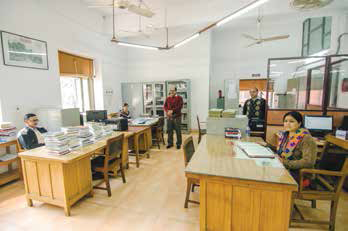
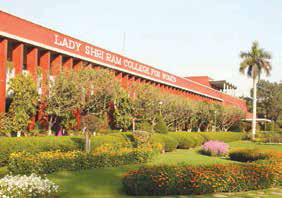
For more than three decades, I’ve been teaching in co-educational institutions and I also thought this way, particularly after going to St Stephen’s and other places which were for boys only. But the LSR story is different. It has a unique character. You ask students and they will say they feel very safe and comfortable here. They feel it’s their own space and they can do here what they want−no inhibitions. They have all the liberty in terms of intellectual space too. Nevertheless, if LSR turns into a co-educational institution, maybe it’ll be better for the girls. But let me tell you, the times haven’t changed much in this respect. I feel that the things have changed a bit only in the urban educated middle class families but otherwise the environment remains the same elsewhere. There are a lot of parents from remote areas who are sending their girls to LSR only because it’s an all girls’ college. Some of the girls coming from such areas probably find it easier to cope up with pressures because it’s a girls’ institution. So, we feel this experiment is working extremely well and there is no need to disturb it. LSR is imbued with the sterling spirit of its founder Sir Shri Ram and we’re working hard to keep intact its reputation as a premier institution of higher learning.
LSR has established itself as a liberal Arts college and prefers to continue in this field only. Besides, science courses would require a different and enhanced infrastructure. This can be considered in due course by following due process in future, if necessary, though we already offer B Sc courses in Mathematics and Statistics.
We’re a constituent college of DU and 95% of our funding comes from the UGC. The rest comes from our trust. We get the same amount of funding that is given to all other trust-run colleges like DAV, Hindu College and Shri Ram College of Commerce (SRCC) −which incidentally was also established by our founder Late Sir Shri Ram, who owned the erstwhile famous company DCM Shri Ram.
It’s just because we’ve some very good practices steeped in tradition and innovations.
LSR is an institution for the entire country. We take pride in the diverse geographical and social representation of students in our institution. Our international collaborations make us a unique institution in Delhi University. The idea of a fixed local reservation is parochial, retrograde and against the universal spirit of education
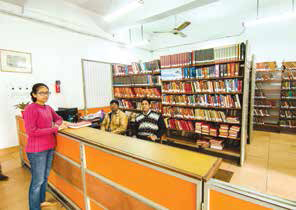
Whenever I give a presentation on LSR, I usually say, it’s an urban oasis in a very heavy traffic area of South-East Delhi. Commuters who travel by the Delhi Metro say that when they see a small patch full of greenery, they know it is the LSR. The credit goes to our Malis who work hard throughout the year
Besides, there is a lot of peaceful co-existence here. You’ll find street dogs around, but the way our girls have adopted them, it’s unbelievable. You’ll find the street dogs sitting together on benches and girls feeding them. That also shows how strong their sense of social responsibility is!
It’s just a two-story building with a lot of green space. Though we can accommodate around 290 students only, we’re very proud of our hostel. In most DU institutions, the hostel mess is outsourced but ours is a self-managed one. We manage everything from breakfast to dinner. We have lowest hostel fees in DU and we’ve six visually challenged students in the hostel. We make sure that they get supportive room-mates.
I was inclined towards academics right since my childhood days in Delhi’s Lady Irwin School. I received the offer to join a DU girl’s college immediately after I finished my MA and enrolled for M Phil at the age of 21. Though it was a fashion to go for civil services, I never wrote the exam because I always wanted to become a teacher. Most of my teaching career so far was gainfully spent in DU’s Motilal Nehru College in South Campus, a co-educational institution, which was not among the prestigious colleges in popular perception and where students from diverse linguistic and socio-economic background converge. It was quite a challenge. I’ve never emphasised on monotonous textbook monologues. Instead I have preferred spirited, interactive and participatory teaching wherein the inhibitions disappear and latent talent comes to the fore. This has blessed me with life-long relationships with students who come back with rich experiences of wherever they perform.
Obviously it feels good, but my becoming Principal of LSR was not the outcome of any conscious effort. Actually, my previous assignment as OSD/Principal of Dyal Singh Evening College was also a surprise offer to me. I gained precious experience in administration while working there. Being from an ordinary middle class background, my selection in LSR belies the popular perception that LSR is an ivory-tower and an elite institution. In fact, I am extremely happy to be Principal in my Alma Mater and highly motivated to do my best for the institution.
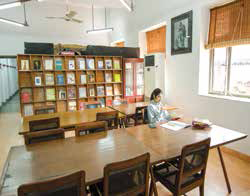
Dr Gopinath was my teacher when I was a student at LSR. Her contribution to this institution is immense. I, therefore, joined this institution as Principal with trepidation in my heart, but also with a steely resolve to carry forward the rich legacy of my teacher. Dr Gopinath, with her long innings and deep commitment, commanded great respect. Besides, I found out that the commitment of LSR faculty to uphold the institutional mission was equally deep. latent and inherent institutional strength has maintained the quality standards of LSR. I’m performing my role as a catalyst to let the institutional strength have a full play and retain/enhance its position as an excellent institution. The ranking/score granted by NAAC (first such assessment) and other entities to LSR this year have given me confidence and satisfaction.
The job of LSR Principal is full time and taxing. Though I enjoy this assignment, I miss my academic and research pursuits. I’ve been working on the politics of global discourse on Climate Change and South Asian response thereto for the last few years and since 2009, I’ve made presentations on this theme in five international and one national conference.
I am basically a Delhiite. Though I was born in Jalandhar (Punjab), I was brought up in Delhi. My father was very keen that I become a doctor, but right from the beginning, I was not interested in that. Impressed with my civics teacher, Mrs Sujata Mukherjee, I thought that I should go for social sciences. My father, a government servant, was quite put off but I convinced him.
Mid-career, I did my PhD in South Asian Studies from JNU. My topic was India and SAARC and my guide was Prof SD Muni, a stalwart on the politics of South and South-East Asian countries. Except for Pakistan, I’ve visited all SAARC countries to gather their perception about Indian policies.
One of the problems we encounter is that the credits are not transferred. We get a lot of students from abroad. They are here for a semester. The credit transfer system is there, but in India, the University Grants Commission (UGC) doesn’t allow us to have the credit transfer system. If something could be done about that, it’ll be good.
The latent and inherent institutional strength has maintained the quality standards of LSR. I’m performing my role as a catalyst to let the institutional strength have a full play and retain/enhance its position as an excellent institution
The ambience in LSR is quite unique. We have a dedicated faculty, which often goes beyond its call of routine duty. The faculty is highly motivated and conscious of its obligations to retain and enhance the quality of the institution. The faculty members update themselves in the field of their specialisation on their own volition. Further, introduction of the Academic Performance Index (API) score for promotions and professional progression has introduced a healthy competition among faculty to keep themselves updated and enhance their academic achievements.
Oh yes, just one suggestion regarding the Academic Performance Indicators (API) system. It is good but there are some teachers who are extremely dedicated to the institution and they’ve given their best. Though they have not been able to do their PhD, they have contributed a lot to the college. They should be given some credit for their contributions.
I feel deeply anxious and worried about the safety of students. Though we can ensure a safe campus for students, the conditions outside are beyond our control. This is a larger social and cultural issue. We make efforts to empower and equip our students with appropriate values and responses to hostile situations. I personally keep in touch with police and other authorities as and when required. Recently the South East District Police launched some good initiatives to enhance patrolling on bikes, particularly in areas where students live on Paying Guest basis.
I lead a simple and straightforward life and want to do my best in the profession. I thoroughly enjoy being with youngsters and making things enjoyable for them in the institution. We should find happiness in small things in life rather than complicating it with complex designs.
By Pradeep Mathur